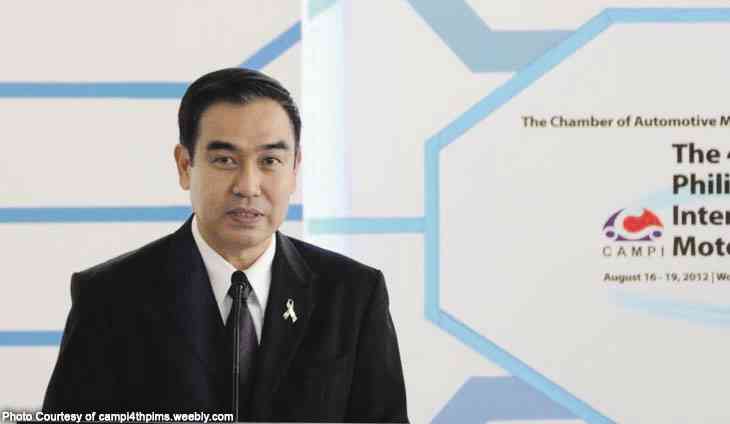Traffic gridlock in Metro Manila, Cebu City, Davao City and other urban centers has elicited numerous suggested solutions, but the Department of Finance has come up with a novel one: reduce the number of new cars on the road by jacking up their prices via higher taxes.
Increasing the excise tax on new cars by 5 percent to as much as 60 percent would discourage people from buying new cars and prevent traffic congestion from getting worse, the DOF claims.
The restructuring of the excise tax on brand new motor vehicles is part of the tax reform package that the DOF submitted to Congress recently.
The DOF says its automotive excise tax proposal, together with other proposals such as raising the excise tax on fuel and expanding VAT from 12 percent to 14 percent, would make up for the estimated P179 billion in revenue lost from the planned reduction of the personal income tax from 32 percent to 25 percent and the corporate income tax from 30 percent to 25 percent.
The problem is that it would derail the Comprehensive Automotive Resurgence Strategy (CARS) program, the head of the country’s biggest auto industry group contends.
P300B economic activity
CARS, which became operational on May 29, 2015 after three years of consultations by the Department of Trade and Industry with the auto industry and its stakeholders, is projected to attract more than P27 billion in new parts manufacturing investments, produce at least 600,000 vehicles, generate around 200,000 new jobs, and propel economic activity estimated at P300 billion.
Chamber of Automotive Manufacturers of the Philippines Inc. (CAMPI) president Rommel Gutierrez says that the proposed higher taxes will have a negative impact on the automotive industry’s sales forecasts which had projected the increasing demand for new motor vehicles to continue in the coming years.
CAMPI, which has 17 member companies representing 19 global automotive brands, is working towards “Vision 2020,” its goal to sell 500,000 units by 2020 mainly through the CARS program.
The effort will be made not only by CAMPI members, but also by the Truck Manufacturers Association, local parts makers and forward and backward linkages.
Inconsistent with CARS
Gutierrez, who is a vice president of Toyota Motor Philippines, expressed concern that the proposed measure is inconsistent with the objectives of the CARS program.
“The CARS program is being implemented in order to attract new investments, stimulate demand, and effectively implement industry regulations that will revitalize the Philippine automotive industry and develop the country as a regional manufacturing hub,” he said.
“With the proposed measure discouraging people from buying new cars, the implementation of CARS could be derailed. Investments required under the program may have to be restudied and potential employment will not be realized.”
The CAMPI head was referring to the auto industry’s plan, in coordination with the government, to increase employment in the manufacturing sector from 9 percent to 15 percent by raising the manufacturing sector’s share to total GDP (gross domestic product) from 23 percent to 30 percent.
Major contributor
Gutierrez pointed out that the auto industry is a major contributor to the country’s
economic growth since it accounts for 12 percent of the industrial sector output and 4 percent of total GDP during the previous administration.
In the last three years, Gutierrez reiterated, the industry generated about a quarter of a trillion pesos in sales, proving that it is one of the major drivers of the country’s industrial sector.
Asked whether CAMPI would seek a lower adjustment of the new tax rate instead of lobbying against it, Gutierrez replied: “The long and midterm plans and programs of the auto industry are based on the existing regulations including the current excise tax structure.
“The unrealistic proposal of new excise tax rates is tantamount to changing the rules in mid-stream,” he added. “This is sending the wrong signal to existing and future investors.”
Meanwhile, the president of the Association of Vehicle Importers and Distributors (AVID) voiced similar misgivings about the proposed increase in excise tax rates for new cars.
AVID has 16 member companies representing 23 world-famous brands. AVID president Ma. Fe Perez-Agudo, who is the chief executive officer and president of Hyundai Asia Resources Inc., said in an online message: “Offhand, any tax increase will have short term negative repercussions on auto sales and revenues as a result of the unfavorable pass-through effects on consumer purchasing power.
Job squeeze
“Over the long run, this may ultimately translate to lower investments in the auto industry and job squeeze which run counter to the intent of government to revitalize and further advance the growth of the industry,” she said.
The DOF proposal on new vehicles provides that an ad valorem tax shall be levied, assessed and collected on automobiles based on the manufacturer’s selling price, net of excise and value added tax (VAT).
If the net manufacturer’s price/importer’s selling price is P600,000 or less, the excise tax will increase from 2 percent to 5 percent.
Motor vehicles priced from P600,000 to P1.1 million will carry a 20 percent excise tax instead of the current tax rate of P12,000 plus excess of P600,000 net price.
If the net manufacturer’s price/importer’s selling price is P1.1 million to P2.1 million, the excise tax will be 40 percent of net manufacturer’s price/importer’s selling price.
Cars priced over P2.1 million will incur a 60 percent excise tax instead of the current rate of P512,000 plus the value in excess of P2.1 million.
Buses, trucks, cargo vans, jeeps and special purpose vehicles as well as second-hand vehicles are excluded from the excise tax restructuring proposal.
House Deputy Speaker Rolando Andaya of Camarines Sur was quoted as estimating that if the measure is approved, a Toyota Innova would cost P400,000 more, a Mitsubishi Montero Sport would cost P600,000 more, and a Mitsubishi Pajero, P1 million more.
Speaker Pantaleon Alvarez told reporters that the DOF’s proposals will undergo serious scrutiny and that the House will come up with its own version of the tax reform package.
